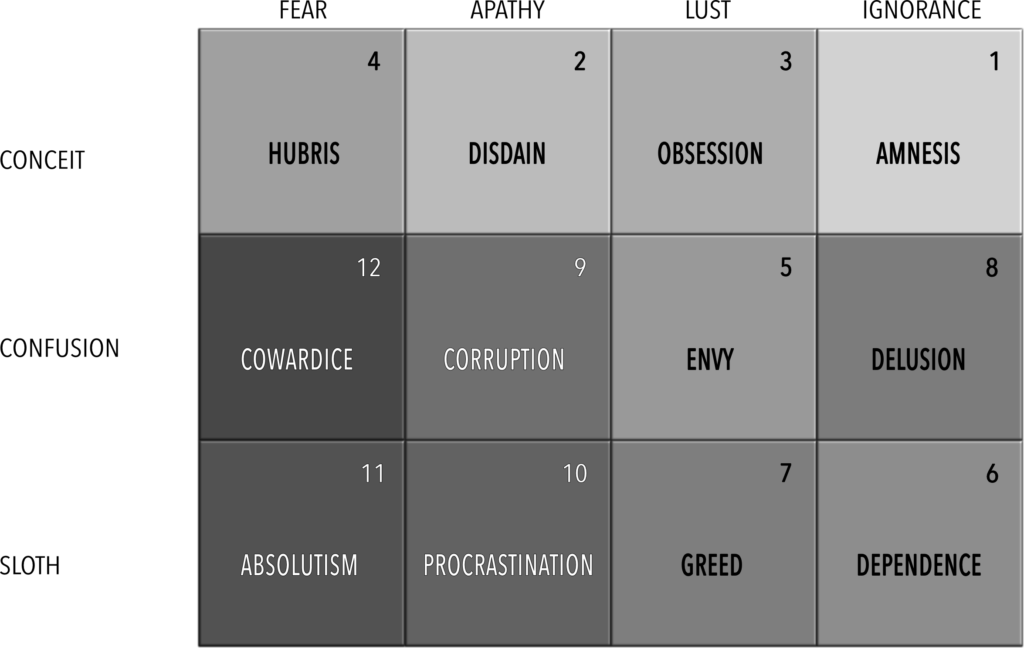corporationspromotesins2
CORPORATIONS PROMOTE PROFITABLE SINS AS VIRTUES PART 2 – DELUSIONS OF CONTROL


Conceit
Conceit is the aspect of materialism that drives dishonesty and the pettiness that stops a person from experiencing gratitude. With conceit, people become blind to what is above and what is below.

Confusion
Confusion is the materialist aspect that negates analysis and disables the ability to act outside of petty self-interests. With confusion, people become easier to manipulate.

Sloth
The sloth aspect of materiality disallows perseverance. Within sloth, a person becomes most subservient and disposed to greater levels of sin, most especially involved with greed and delusions. With sloth, people are most selfish.

“Bolshevism and Big Business are very much alike; they are both built on the truth that everything is easy and simple if once you eliminate liberty. And the real irreconcilable enemy of both is what may be called Small Business.” – G.K. Chesterton
The whole corporatist process and structure has the appearance of progress to the servile individual so encouraged into their Telos domain selves toward mindless ‘money-making,’ or at least attempted (Roe 2023a, Roe 2023c). They expend their energies toward the goals of these fictional entities incompatible with the interests of family, friends, themselves, community, or society. However, they do win a bi-weekly prize in the form of a cheque as well as pay rises, holiday bonuses, curriculum vitae fodder, and promotions.
“They expend their energies toward the goals of these fictional entities incompatible with the interests of family, friends, themselves, community, or society.”
CONFUSION AND SLOTH
Envy renders a person incapable of tolerating excellence, believed to be based on lies necessarily, due to the involuntary projecting of the dishonest self (Roe 2023e). Doubt in the existence of excellence forces a deepening dependence upon surrounding powers, subconsciously presumed supreme by ‘might,’ which is victory at any cost, the false “excellence” known before actual excellence. All that remains then, in terms of a life goal, is greed. This greed is demonstrated by the common servant’s goal of being awarded the highest price in service to a corrupt and detrimental system. The problem with being a servant is they are not typically permitted to have opinions or growth.
- Confusion and Sloth are central to internalised sin.
- Envy takes the place of excellence.
- Servant’s morality in highest fee that can be extracted.
- “Victory” at any cost.

Figure 1 – Sin Chart – The three aspects of Materiality are labelled on the left with the four moments labelled above. The ‘Dirty Dozen.’ For more information: Resurrexit Spiritus
Envy
Basic inability of tolerating true excellence.
Based in confusion and lust.
Dependence
An over-reliance upon others. Leads to distorted perspective.
Based in ignorance and sloth.
Greed
Inability to conceive of universal conservation.
Based in lust and sloth.
Internalisation of Sin
The alignment of internal and external qualities to match the complex of materiality throughout experience.
DEPENDENCE, GREED, AND FALSE HOPES
The sloth of dependence and greed go hand-in-hand, progressively escalating each other (Roe 2023e). This is because the moments of sloth in which dependence and greed occur are ignorance and lust. Together, ignorance and lust moments in the aspects of confusion and sloth alter the foundations of consciousness. This contributes to confusion and mass-formation of specific delusions encouraged through the basic alienation inherent of corporate culture (Roe 2023d), in alignment with Dr. Matthias Desmet’s theories (Desmet 2022). Alienated servants are constantly engulfed by the needs messaging of the corporate masters, and so the delusions take this shape. These directed delusions have to do with the state of the World, the place of individuals, and how people are told they can improve conditions, society, or the self.
DELUSIONS AND INTERNALISATION OF SIN
The purpose of the material-skill in delusion, at this point, is to force compatibility between the elements of external sins and the four internal sins. Delusion is the externalised sin closest to the four internalised sins. Between internalised and externalised sins, delusion generates the distortions that falsely align the misaligned reflections of reality, allowing high levels of functionality despite self and other destructiveness. Presence of mounting delusions prefigures the internalised expansion of sins.
Corruption, procrastination, absolutism, and cowardice deepen in the darkness of dependence and greed, finally breaking realism and integrating false reality in a targeted psychosis. Envy, dependence, greed, and delusion in people all suit the needs of corporations very well, so that their upper leadership can be guaranteed to embody those internalised sins, all wrongly perceived as virtues as well. Corruption is the most visible but allows a person to accept a greater degree of evil. Procrastination, at an advanced stage, begins to appear like delegation when given authority. Absolutism is seen as dedication, where it is merely blunt stupidity. Cowardice drives all these sins deeper by enabling avoidance while being seen as cautiousness in its advanced stage.
INCORPORATED TOOLS
Your enemy need not kill you, if he can make you do the wrong things. People deadened to true spiritual desires are the demoralised tools most fit for the designs of corporatism. Demoralised people, pushed into such sins accepted as virtues, become automatons by expending personal labour as a pure transaction, like selling an ear of corn or buying a bicycle. They do not like it, but they have to, knowing nothing better. Historically, corporations seek precisely the person in such a state of mind because they do as they are told without asking questions, often regardless the possible moral ramifications. When afforded the opportunity to give charity or have a say in governance, corporations will always push toward basic demoralisation. These demoralised people believe themselves to be productive and efficient for their corporate overlords. Accepting sins as virtues transforms the demoralised into the virtuous.
IMPORTANCE OF LABOUR AND EROSIC PRIMACY
This is not to diminish the importance of labour expended for the satisfaction in craft or product. It is true that the simple ‘act of doing’ does much good in itself. Rather, this is intended to condemn the waste inherent of production toward unworthy goals. Satisfaction can be a very worthy goal.
Personhood
The personhood of the corporation takes fundamental precedent over the personhood of the composite individuals, with all goals subsumed.
True Virtues
*The corporatists do not want people to develop virtues, learn more here:
Resurrexit Spiritus
Regardless of which state, human energies in the Telos domain are expended not for the satisfaction, meditation, or temporary goals, but for growth into Erosic primacy, the domain of self and other connectedness (Roe 2023c). If all of the rules of the overarching society are rejected in the Kratos domain, those rejections imply an alternative set of rules for behaviours. This is regardless of whether alternative behaviours are functionally antisocial, psychotic, or accepted among sub-cultural peers. Of course, Erosic imbalance is likely with the presence of additional complications in lower phenomenal domains.
MEANING
The more serious and higher mortality an industry, the greater the compunction for absolute vertical alignment in the ranks but to what end and how much is of maximal value (Roe 2023b)? Should the ranks of healthcare, a high mortality industry, align to business protocols? Does that help alleviate some of the mortality? Obviously, some value can come from strict adherence to wisdom of experts within that industry, but not typically experts from most others, especially those entangled. This is obviously true in the interplay between healthcare and business.
SUMMARY
In track record terms, are corporations worthy of the precious gift that is human energies? Human trust? Can corporations respect boundaries? Are they beneficial for humanity or individual humans? They might be aligned temporarily if leaders can be honest and remain so. However, contributing to corporations in any capacity ultimately empowers corporatism overall. Corporatism is always out of alignment with individual and communal goals, as a rule. It is plain to see that legitimate virtues lead to a future freed of corporatism, not further into the enslavement closing around humanity currently.

Light Through Darkness
A future freed from corporatist war mongers.

Purpose of Humanity
We are bigger.
REFERENCES
Desmet, M. (2022). The Psychology of Totalitarianism. Chelsea Green Publishing.
Roe, M. A. (2023a). Corporations Promote Profitable Sins as Virtues part 1. 24K Journal of Virtues Science. Series 1 Issue 1. Corporations Promote Profitable Sins as Virtues part 1 – Material Idealism
Roe, M. A. (2023b). Little Boots on the Beach – How Organisational Mortality Invites Autocratic Corruption. 24K Journal of Virtues Science. Series 1 Issue 1. Little Boots on the Beach – How Organisational Mortality Invites Autocratic Corruption
Roe, M. A. (2023c). Resurrexit Spiritus part 3 – Resurrexit Theory – The Dualist Expansion of Structural Phenomenology. 24K Journal of Virtues Science. Series 1 Issue 0. Resurrexit Spiritus: Spiritual Phenomenology, Evolution of Spirit, First Other Theory of Fatherhood Attachment, and Structural Virtues System
Roe, M. A. (2023d). Serf and Turf parts 1-3. 24K Journal of Virtues Science.
Roe, M. A. (2023e). Structural Virtues Theory – The Dozen Skills in Reason – Resurrexit Spiritus part 5. 24K Journal of Virtues Science. Series 1 Issue 0. Resurrexit Spiritus: Spiritual Phenomenology, Evolution of Spirit, First Other Theory of Fatherhood Attachment, and Structural Virtues System